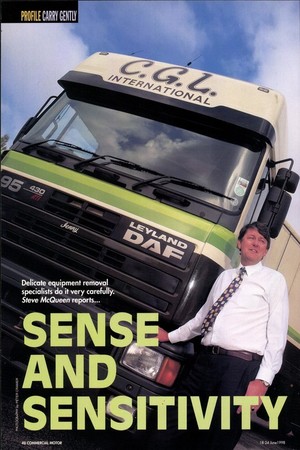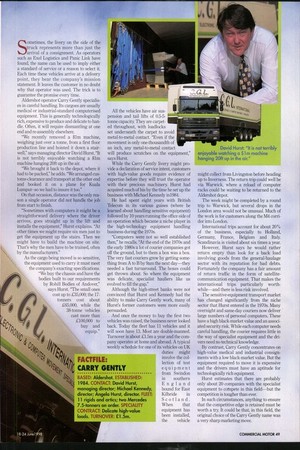S NSIT V TY Delicate equipment removal specialists do it very carefully. Steve McQueen reports...
Page 50

Page 51

If you've noticed an error in this article please click here to report it so we can fix it.
FACTFILE: CARRY GENTLY BASED: Aldershot. ESTABLISHED: 1984. CONTACT: David Hurst, managing director; Michael Kennedy, director; Angela Hurst, director. FLEET: 11 rigids and artics; two Mercedes 7.5-tonners on order. SPECIALITY CONTRACT: Delicate high-value loads. TURNOVER: £1.5m. Sometimes, the livery on the side of the truck represents more than just the arrival of a consignment. As operators such as Exel Logistics and Panic Link have found, the name can be used to imply either a standard of service or a reason to select it. Each time these vehicles arrive at a delivery point, they bear the company's mission statement. It leaves the customer in no doubt why that operator was used. The trick is to guarantee the promise every time.
Aldershot operator Carry Gently specialises in careful handling. Its cargoes are usually medical or industrial-standard computerised equipment. This is generally technologically rich, expensive to produce and delicate to handle. Often, it will require dismantling at one end and re-assembly elsewhere.
"We recently removed a $1m machine, weighing just over a tonne, from a first floor production line and hoisted it down a stairwell," says managing director David Hurst. "It is not terribly enjoyable watching a $1m machine hanging 20ft up in the air.
"We brought it back to the depot, where it had to be packed," he adds. "We arranged customs-clearance and transport at the other end and booked it on a plane for Kuala Lumpur–so we had to insure it too."
On that occasion, distance was the only reason a single operator did not handle the job from start to finish.
"Sometimes with computers it might be a straightforward delivery where the driver arrives, goes straight up in the lift and installs the equipment," Hurst explains. "At other times we might require six men just to get the equipment up the stairs. Then we might have to build the machine on site. That's why the men have to be trained, often by the manufacturers."
As the cargo being moved is so sensitive, the equipment used to carry it must meet " the company's exacting specifications.
"We buy the chassis and have the bodies built to our requirements by Rohill Bodies of Andover," says Hurst. "The small ones cost up to £35,000; the 17tormers cost about £65,000, while the 38-tonne vehicles cost more than £100,000 to buy and equip." All the vehicles have air suspension and tail lifts of 0.5-5tonne capacity. They are carpeted throughout, with loadlocks set underneath the carpet to avoid metal-to-metal contact. "Even if the movement is only one-thousandth of an inch, any metal-to-metal contact will produce scratches on the equipment," says Hurst.
While the Carry Gently livery might provide a declaration of service intent, customers with high-value goods require evidence of expertise before they will trust the operator with their precious machinery. Hurst had acquired much of his by the time he set up the business with Michael Kennedy in1984.
He had spent eight years with British Telecom in its various guises (where he learned about handling sensitive equipment) followed by 10 years running the office side of an operation which became a niche player in the high-technology equipment handling business during the 1970s.
"Computers were not so well established then," he recalls. "At the end of the 1970s and the early 1980s a lot of courier companies got off the ground, but to them a box was a box. The very fast couriers grew by getting something from A to B by 9am the next day—they needed a fast turnaround. The boxes could get thrown about. So where the equipment was delicate, specialist hauliers like us evolved to fill the gap."
Although the high-street banks were not convinced that Hurst and Kennedy had the ability to make Carry Gently work, many of Hurst's former customers were more easily persuaded.
. And once the money to buy the first two vehicles was raised, the business never looked back. Today the fleet has 11 vehicles and it will soon have 13. Most are double-manned. Turnover is about £1.5m a year and the company operates at home and abroad. A typical weekly schedule for one of its vehicles on UK duties might involve the collection of test equipment from Swindon in southern England bound for East Kilbride in Scotland. When that equipment has been installed, the vehicle might collect from Livingston before heading up to Inverness. The return trip could well be via Warwick, where a reload of computer racks could be waiting to be returned to the Aldershot depot.
The week might be completed by a round trip to Warwick, but several drops in the London area would not be unusual. Much of the work is for customers along the M4 corridor into London.
International trips account for about 20% of the business, especially to Holland, Germany, France, Belgium and Italy. Scandinavia is visited about six times a year.
However, Hurst says he would rather return empty than look for a back load involving goods from the general-haulage sector with its reputation for bad debts. Fortunately the company has a fair amount of return traffic in the form of satellitecommunication equipment. That makes the international trips particularly worthwhile—and there is less risk involved.
The sensitive-equipment transport market has changed significantly from the niche sector that Hurst entered in the 1970s. Many ' overnight and same-day couriers now deliver large numbers of personal computers. These have a high black-market value and an associated security risk. While each computer needs careful handling, the courier requires little in the way of specialist equipment and the drivers need no technical knowledge.
By contrast, Carry Gently concentrates on high-value medical and industrial consignments with a low black-market value. But the equipment required to move it is expensive and the drivers must have an aptitude for technologically rich equipment.
Hurst estimates that there are probably only about 20 companies with the specialist equipment to compete in this field—but the competition is tougher than ever.
In such circumstances, anything to ensure that the competitive edge is retained must be worth a try. It could be that, in this field, the original choice of the Carry Gently name was a very sharp marketing move.




















































































































